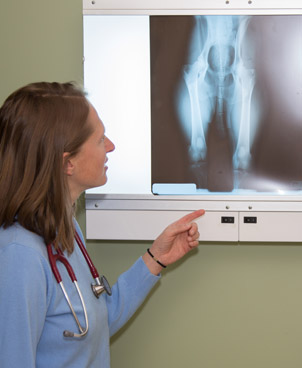Diagnostic Services at Fieldstone Animal Hospital
Radiology • In-House Laboratory
 Radiology
Radiology
Radiographs (X-rays) are extremely helpful for diagnosing and monitoring many medical and surgical conditions in your pet. X-rays are useful for assessing your pet's bones, lungs, heart, abdomen, oral cavity and other body areas. If a lump or growth is found on your pet during an examination, radiographs can often determine the size, shape and location of the mass. An x-ray can spot a fractured bone, detect bladder stones, help with the diagnosis of heartworm disease or locate an obstruction or foreign body (a bone, toy, or piece of clothing) in your pet's intestine or stomach. X-rays are also useful for diagnosing heart and lung problems and can be used to evaluate hip and elbow dysplasia in dogs.
Fieldstone Animal Hospital has invested in x-ray technology that produces high quality radiographs, allowing us to diagnose your pet's medical condition quickly and accurately.
In-House Laboratory
When we need to rely on diagnostic tests in order to make an accurate diagnosis, we are very grateful for our in-house diagnostic laboratory at Fieldstone Animal Hospital. Your pet's test results are often ready within a matter of minutes.
Our laboratory is capable of processing a variety of tests, including CBC/chemistry, urinalysis, fecal analysis, cytology, heartworm and tick borne illness screening (such as lyme, ehrlichia, and anaplasmosis), feline viral disease screening (feline leukemia and feline immunodeficiency virus), pancreatitis blood test, and parvovirus. Your pet's laboratory test results are analyzed and interpreted by our team of specially trained veterinary technicians, enabling us to provide fast, accurate treatment for your pet.
Below are basic descriptions of some important diagnostic tests:
Complete Blood Count (CBC)
CBC measures the number of red blood cells, white blood cells and platelets in a sample of blood. The numbers of each type of cell provides information to help diagnose anemia, infections and leukemia. If your pet is undergoing treatment for a condition, a complete blood count can help your veterinarian monitor how your pet is responding to the treatment.
Blood-Chemistry Panel (Chem Profile)
A blood-chemistry panel measures electrolytes, enzymes and chemical elements of your pet's blood. Included in a chem profile are important components such as calcium and phosphorous levels, liver enzymes, glucose and total protein. These measurements help us determine how your pet's organs are functioning. Blood-chemistry panels aid in the diagnosis and treatment of illness, in addition to monitoring your pet's response to treatment. A blood-chemistry panel often screens for potential problems and risks before anesthesia is administered.
Fecal Examination (Fecal)
Fecal analysis lets us diagnosis problems and diseases, including difficulties with digestion, internal bleeding and pancreatic disorders. Most importantly, a fecal examination confirms the presence of intestinal parasites, including roundworm, hookworm, whipworm, tapeworm and giardia. A fecal examination is part of your pet's complete wellness examination.
Urinalysis (UA)
Laboratory testing of your pet's urine can help detect the presence of specific substances that normally do not appear in urine, including protein, sugar, white blood cells or blood. Measuring the dilution or concentration of urine helps us diagnose illnesses such as urinary tract infections, diabetes, dehydration, kidney problems and other medical conditions.